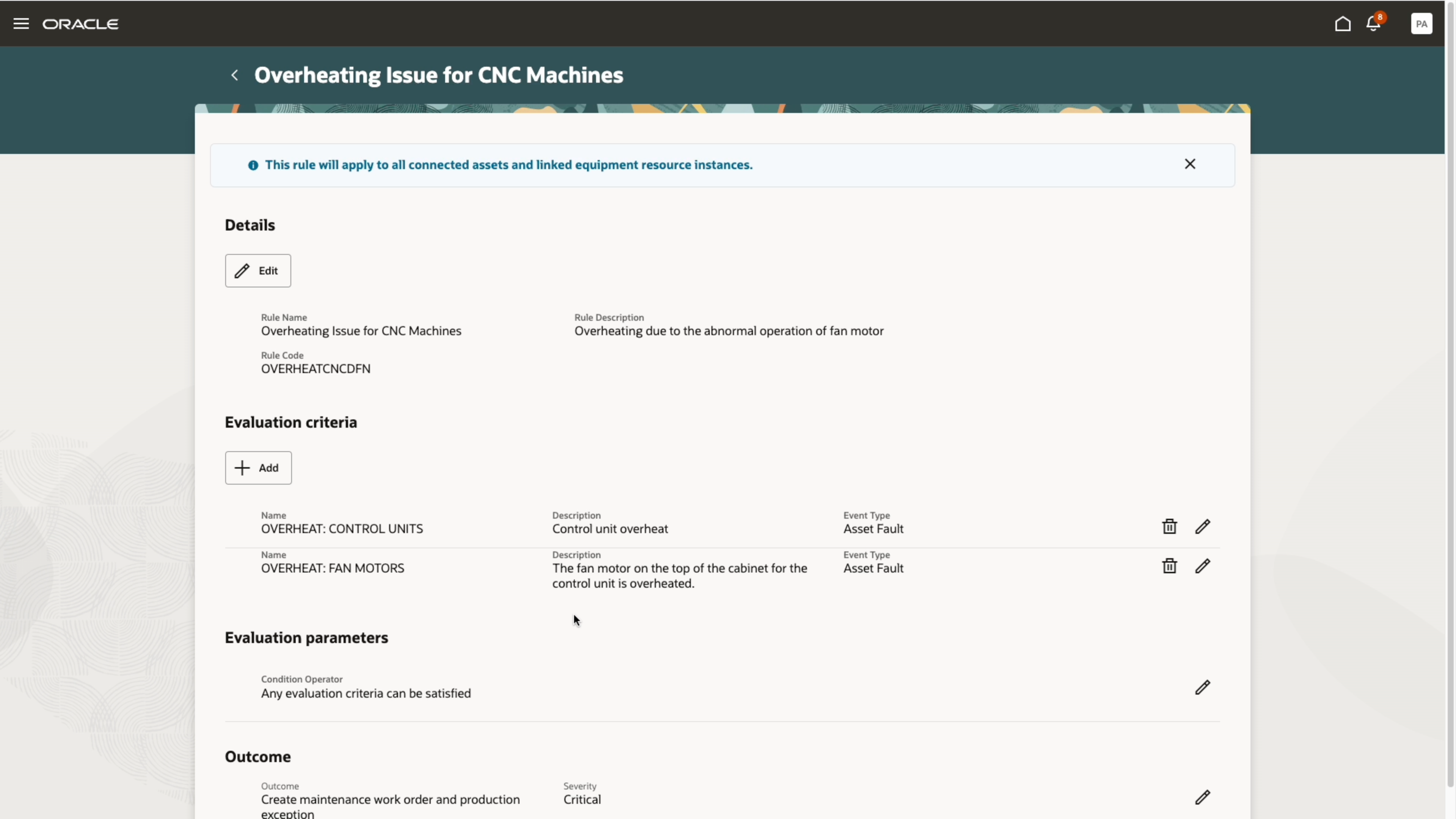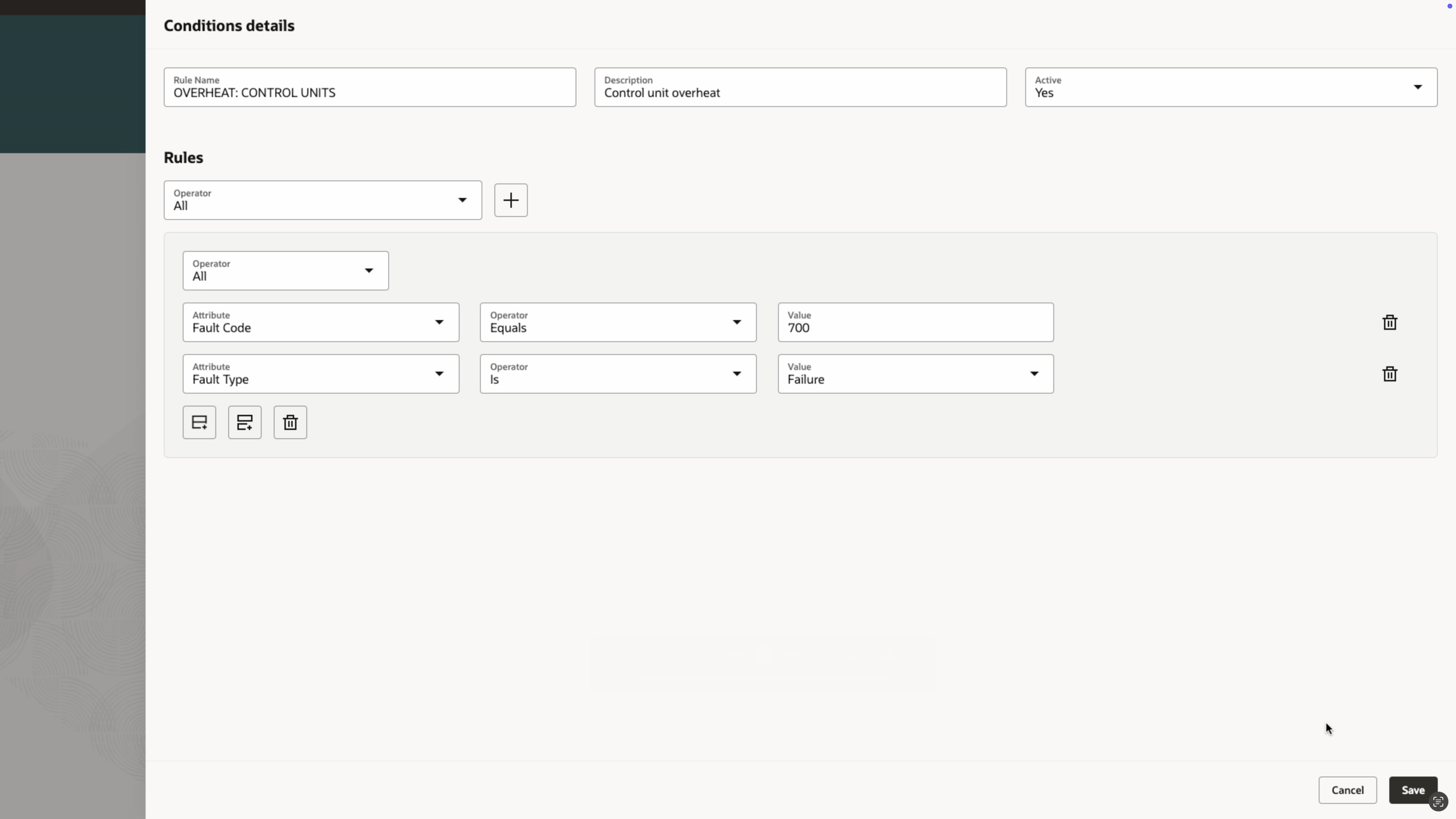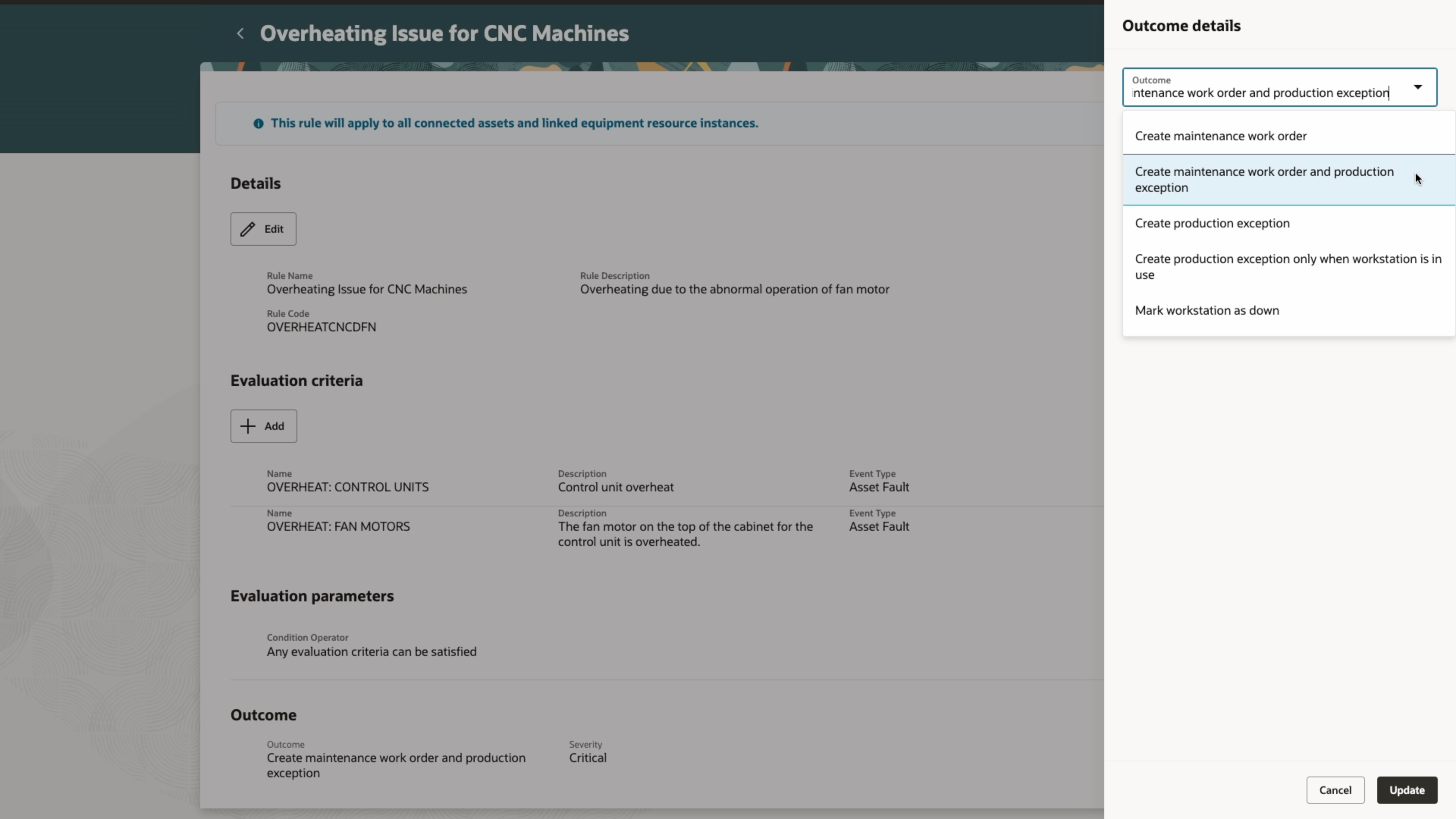Create Automatic Production Exceptions for Equipment Related Events at a Workstation
Operators usually create production exceptions for equipment errors and failures encountered during manufacturing execution. The production supervisor then helps them resolve the exception. The process of manually detecting and reporting equipment issues impacts operator efficiency and the overall uptime and Mean Time to Recovery (MTTR) for the equipment. With this update, a machine event from a connected equipment can be leveraged, using IoT communication, to automatically create a production exception at the workstation. The workstation status can also be changed to Down for equipment failures, based on user defined rules governing the machine event.
Both the operator, who is working at the workstation, and the supervisor, who is managing the production, can view the automatic production exception that is created. If a rule is configured to create a maintenance request, then a maintenance work order is automatically created in Oracle Maintenance without any intervention from the operator or supervisor.

Create Operational Rules

Set Evaluation Criteria

Set Outcomes for Operational Rules
Automated problem reporting saves time for operators during work execution and enables supervisors to respond to issues without any delay. Operators and supervisors get better insight into the actual issue, as the machine event is directly reported by the equipment.
Here's the demo of these capabilities:
Steps to Enable
To enable this feature you need to log a Service Request (SR).
- Select Product Module - Oracle Fusion Manufacturing Cloud Service.
- Select Category - Work Execution.
- Select Subcategory - Manage Work Orders.
- Select Component: Installation Issue (INSTALL).
- Copy and paste this text into description area of the SR: Enable the SCM Core Service-Smart Operations.
This feature requires the SCM Core Service-Smart Operations service to be provisioned on your instance. Please note that this service can be enabled only on pods that are available on Oracle Public Cloud regions. Once this service is enabled, you can access the user guide and implementation guide to learn more about this feature and how to set it up.
Tips And Considerations
- Operational rules configured by users apply to all connected assets and linked equipment resource instances in all manufacturing and maintenance organizations.
- Attributes of events of type Asset Fault and Asset Status can be used as inputs for evaluation criteria.
- All or Any operators can be defined within the rule at the top level.
- Operators on attributes can be defined as subgroups for the rule. Supported operators for event attributes are: Equals, Equals (case insensitive), Not equals, Not equals (case insensitive), Contains, Does not contain, Starts with, and Ends With.
- If multiple evaluation criteria are defined, then to achieve the AND operator result, you can set Evaluation Parameter Details to "All evaluation criteria must be satisfied within the evaluation window". This lets you set a time window within which all conditions should be met for the outcome actions to be triggered.
- To ensure that multiple production exceptions for the same operational rule are not created, the application does not allow a second production exception to be created if the first exception is in open state. The same is true for maintenance work orders: The application does not allow a second maintenance work order to be created if the first maintenance work order is not closed already. Duplicate production exceptions or work orders are hence avoided.
- The supported outcome actions are:
- Create maintenance work order.
- Create maintenance work order and production exception.
- Create production exception.
- Create production exception only when workstation is in use.
- Mark workstation as down.
- Equipment instances signals received via industrial communication protocols need to be converted to a REST payload that Fusion Manufacturing Cloud can ingest and take actions on. The accepted payload specifications are documented here: REST API for Oracle Fusion Cloud SCM.
Key Resources
- Watch the feature demo for Create Automatic Production Exceptions for Equipment Related Events at a Workstation.
- Oracle Fusion Cloud SCM: Refer to the Using Manufacturing guide, available on the Oracle Help Center.
- Oracle Fusion Cloud SCM: Refer to the Implementing Manufacturing and Supply Chain Materials Management guide, available on the Oracle Help Center.
Access Requirements
Users who are assigned a configured job role that contains the following duty roles and privileges can use this feature:
- View Operational Events (SMO_VIEW_EVENT_LOGS_PRIV)
- View Operational Events (ORA_DR_SMO_VIEW_OPERATIONAL_EVENTS_MFG_DUTY)
- Manage Operational Rules and Events (ORA_DR_SMO_MANAGE_OPERATIONAL_RULES_AND_EVENTS_MFG_DUTY)
- Manage Operational Rules (SMO_MANAGE_OPERATIONAL_RULES_PRIV)
- Access HCM Common Components (HRC_ACCESS_HCM_COMMON_COMPONENTS_PRIV)
- Manage HCM Rules (HRC_MANAGE_HCM_RULES_PRIV)
The preceding duty role is introduced in this update.
Guided Journeys : Role Codes
- Use REST Service - Guided Journeys Read Only (Role Code ORA_PER_REST_SERVICE_ACCESS_GUIDED_JOURNEYS_RO)
- Use REST Service - Guided Journey Responses (Role Code ORA_PER_REST_SERVICE_ACCESS_GUIDED_JOURNEY_RESPONSES)